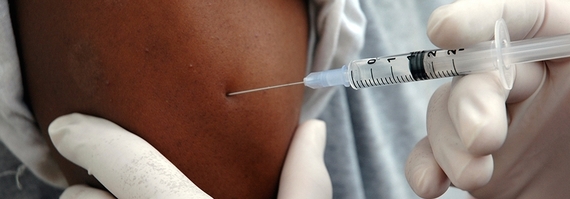 By Joni Blecher
By Joni Blecher
Immunizations given to children at an early age have been instrumental in helping curb vaccine-preventable diseases such as measles and whooping cough, but keeping track of those immunizations over the long term can be challenging in the best of circumstances. How many of us have had to call a parent or contact a doctor's office to locate a personal vaccination history? Some local health departments here in the United States track vaccinations using tools such as Immunization Information Systems (IIS) and Vaccine Tracking Systems (VTrcksS). While these are useful options, it's ultimately up to the individual to maintain personal records.
In developing countries, where vaccines are often provided by mobile clinics, maintaining accurate records is even more difficult. Many children don't have immunization cards and paper records are easily lost or destroyed. As a result, the actual immunization coverage in many countries is not accurately known. Awareness of vaccination status and coverage remains critical to managing vaccine delivery programs, as well as to deciding on the quantities of vaccines required for specific populations.
One potential solution comes from researchers at Michigan State University, who have developed a way to maintain vaccination records in infants and toddlers using something they'll always have with them: their fingerprints.
While this may seem like an obvious solution, scanning the fingerprints of children is problematic. Many commercial fingerprint scanners currently available aren't designed to work with the smaller digits of babies. Getting children to place their fingers correctly on the sensor and hold them steady is another hurdle. And newborns tend to have oily or wet fingers that can make it nearly impossible to capture a usable fingerprint image.

Funded by the Bill and Melinda Gates Foundation, the MSU researchers developed a new method for collecting this data using an optical fingerprint reader and custom software. Trials of the system conducted in Benin, West Africa and in East Lansing, Michigan, look promising. The team held multiple sessions with each child to capture multiple impressions per finger. They also took pictures of the children to help health workers with identification. The team then added the impressions photos to the database. When a child returns to receive another vaccination or booster shot, another fingerprint scan is taken and compared to the database. Once a match is determined, health workers can view the corresponding immunization record and proceed accordingly.
The trial in East Lansing yielded 98 percent accuracy. The trial in Benin, conducted in humid conditions and with fewer children, was able to successfully match about 67 percent of the prints to children.
"The process can still be improved but we have shown its feasibility," said Michigan State University professor Anil Jain. "We will continue to work on refining the fingerprint matching software and finding the best reader to capture fingerprints of young children, which will be of immense global value. We also plan to conduct a longitudinal study to ensure that fingerprints of babies can be successfully matched over time."
Here at XPRIZE, we consider Immunization Detection one of the many Grand Challenges that could potentially be solved by a prize that will inspire the creation of a method to quickly, accurately and non-invasively assess vaccination status in adults and children around the world.
To see all of our Grand Challenges and prize concepts, or to cast you vote for the next XPRIZE, click here. You can also sign up for our exclusive newsletter or donate today!
Joni Blecher is a freelance writer who has spent her career covering tech and a myriad of lifestyle topics. When she's not writing, you can find her exploring the food scene in Portland, OR.
Visit XPRIZE at xprize.org, follow us on Facebook, Twitter and Google+, and get our Newsletter to stay informed.